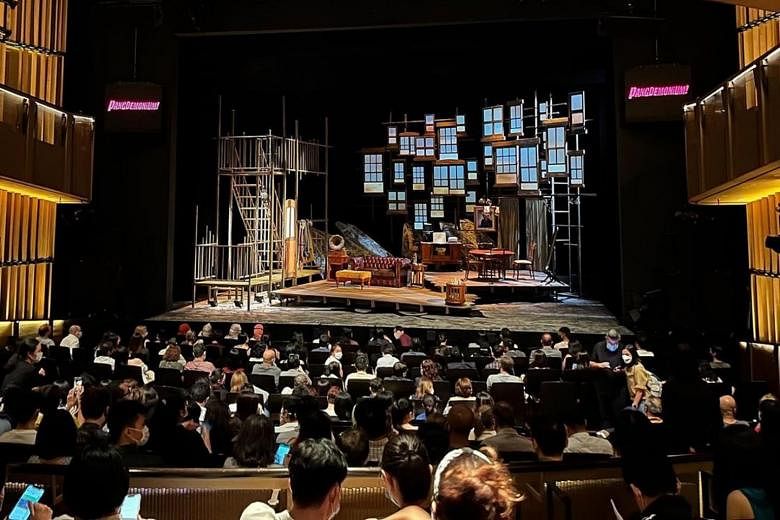SINGAPORE - Arts groups and concert organisers are rushing to ramp up ticket sales, as the streamlining of safe management measures relaxes restrictions for shows and allows full houses for some.
Since Tuesday (March 15), live performances have no longer been subjected to seating capacity restrictions, so long as there are not more than 1,000 audience members.
Theatre company Pangdemonium's play The Glass Menagerie, which runs from March 11 to 27, is its first show at full capacity since Covid-19 restrictions hit Singapore's performing arts scene in 2020.
Co-founder Adrian Pang, 56, told The Straits Times on Wednesday that the company's five performances of Tennessee Williams' play so far had each filled 50 per cent to 60 per cent of the 614-seat Victoria Theatre.
The company was working with 30 per cent audience capacity under the earlier measures.
"Pre-pandemic, our first few performances would have hit up to 90 per cent houses," said Pang.
He added that the rest of the run would continue to be a challenge to sell, but that this was "just one step - a very significant and much needed step - towards life coming back to life".
In March 2020, theatres had to close due to the pandemic and would remain shut for more than six months.
When live performances were allowed to resume, groups reckoned with measures such as limits on the number of performers allowed on stage and backstage, and "bubble-wrap" seating where seats in front, behind and to the left and right of patrons were left empty for social distancing purposes.
Now, a flurry of productions are rushing to fill those seats, from Wild Rice's play Tartuffe, which opens at the Ngee Ann Kongsi Theatre in Funan mall on April 7, to at least two Singapore International Festival of Arts shows at Victoria Theatre in May.
A concert by the Singapore National Youth Chinese Orchestra on Saturday will go ahead at full audience capacity at the 831-seat Singapore Chinese Orchestra (SCO) Concert Hall.
Several upcoming SCO concerts had been approved as VDS (vaccination-differentiated safe management measures) + Test shows, which could have full audience capacity and no cap on performer and crew numbers, subject to certain requirements.
These include a trilogy of concerto concerts, beginning on March 26, and a Mother's Day concert on May 7, featuring a full orchestra with vocalist Joanna Dong.
With the new easing of measures, audience members of the VDS+Test pilot shows need not do an antigen rapid test (ART) before the show, but performers and crew still have to do ARTs every rehearsal or performance day.
SCO executive director Terence Ho, 52, estimated that with a full orchestra, the cost of ART kits could amount to about $600 each day.
He hopes the measures will be further eased so pre-rehearsal ARTs will no longer be necessary.
Instead, they could operate based on social responsibility and simply get tested or stay home if they are feeling unwell.
"When you walk on the street, you don't know who is positive and who is negative. How long can we insist on doing this testing over and over again?"
Concert organiser IMC Group Asia has increased the capacity to upcoming concerts such as the Urban Sonic Music Festival Retro Edition from Saturday to March 26 at *Scape The Ground Theatre.
Chief operating officer Romell Song said: "This round of relaxation is really a lifeline for artistes, musicians and event organisers."
Concert promoter LAMC Productions, however, is only keen to do shows for audiences of more than 1,000. These will not need pre-event testing, provided the venue's capacity is capped at 50 per cent.
Co-owner Ross Knudson said: "It's a welcome step forward but we still need 100 per cent capacity for most international acts. The costs are just too high to make it work on a 50 per cent venue cap."
Wild Rice artistic director Ivan Heng, 57, said the move brings relief, but recovery remains slow.
"Even with houses at full capacity, companies will still have to depend on grants and the support of donors. Costs have ballooned, for example, with compulsory testing, cleaning and employing understudies.
"The performing arts community has been deeply scarred by the pandemic. The industry has lost many people and many companies are on the brink of extinction. There are also audiences who have avoided live performances and have lost the habit of attending them. We need to win back their confidence."

